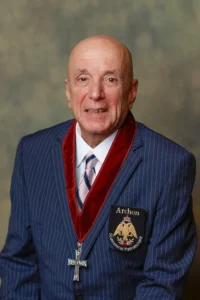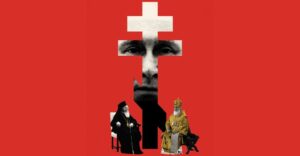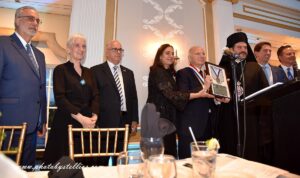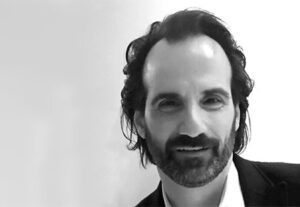|
|
| Archons Economidis and Adamantiades with His Excellency Gabriel Koptsidis, Ambassador of Greece to Poland at the Greek Embassy. |
Archons Theofanis Economidis and Achilles G. Adamantiades, PhD delivered religious freedom presentations for the Ecumenical Patriarchate on behalf of the Order of St. Andrew, at Europe’s largest human rights conference, The Human Dimension Meetings of the Organization for Security and Cooperation in Europe (OSCE), September 29 and 30. The OSCE is the world’s largest regional security organization whose 56 participating States span the geographical area from Vancouver to Vladivostok. Below are their presentations at the working sessions of the conference which was held in Warsaw, Poland:
Working Session 2: Freedom of Religion or Belief
September 29, 2009, 10:00 AM
Subject: Religious Freedom for the Ecumenical Patriarchate
Presenter: Theofanis Economidis (Order of St. Andrew The Apostle)
|
|
| Archon Theofanis Economidis at the podium. |
Mr. Chairman, Ladies and Gentlemen:
We are here on behalf of the Ecumenical Patriarchate in order to highlight its important rights and prerogatives and the serious impediments and threats that this 2000-year old religious institution is facing on a daily basis: We are doing this mindful of current Turkish aspirations to join the European Union and of certain encouraging recent events.
1.The Turkish government does not recognize the “Ecumenical” status of the Patriarch and Patriarchate:
The term or title “Ecumenical” has been used since the 6th century A.D. and is recognized and used universally throughout the world. Officials of the Turkish Republic must understand that the Ecumenical Patriarch is the spiritual leader of 300 million Orthodox Christians in the world and not just the Bishop of a local congregation, as the Turkish Government contends.
2. The Ecumenical Patriarchate currently has no legal identity or bona fide personality in Turkey:
The Turkish authorities do not allow the Ecumenical Patriarchate to own property, not even its churches. It is absolutely imperative that the Patriarchate be afforded legal standing, so that it can appear in court and defend itself when its property is illegally confiscated.
3. The Turkish government interferes in Patriarchal Elections:
The Ecumenical Patriarch, and Hierarchs who elect him, must be Turkish citizens at the time of the election. In fact, the government arbitrarily reserves to itself veto power for any candidate for the position of Ecumenical Patriarch. The Ecumenical Patriarchate should be permitted to elect freely and without interference future Patriarchs who are not Turkish citizens at the time of their election. There is a precedent for this as for example, Ecumenical Patriarch Athenagoras I (1948-1972) was an American citizen at the time of his election. If this veto right practice continues, it may lead in the eventual closure of the Ecumenical Patriarchate.
4. The Ecumenical Patriarchate is unable to train new clergy in Turkey because its Theological School of Halki was forcibly closed down by the Turkish Government in 1971.
Severe visa restrictions on priests and students who wish to visit the Patriarchate in order to study and serve there, coupled with the school’s closure have deprived this religious institution of the ability to train its clergy and lay theologians. The Ecumenical Patriarchate should be allowed to reopen its Seminary at Halki otherwise its future will be seriously imperiled.
5. The Turkish government has confiscated thousands of properties from the Ecumenical Patriarchate.
In 1936, the Church owned more than 8,000 properties but, by 1999, the number was down to about 2,000 and today, the number is less than 400. These Properties, including monasteries, church buildings, schools, and land, should be returned or arrangements made for appropriate restitution.
6. Decades of harassment and seizure of property have accomplished their nefarious purposes and, as a result, the local Orthodox population has been significantly diminished to less than 3000.
The Ecumenical Patriarch and all his predecessors have always presented themselves and indeed behaved as law-abiding Turkish citizens.
The Ecumenical Patriarchate does not proselytize and presents no threat to Turkish society.
The present Ecumenical Patriarch was born in Turkey and is a Turkish citizen. Yet his life has been under constant threat.
In Conclusion:
Having stated these unacceptable violations of religious and legal rights, we are encouraged by recent events, most notably by the visit of Prime Minister Erdogan together with the Ecumenical Patriarch to the Orphanage of Buyukada. This visit was an indirect, if not explicit, acknowledgement of ownership rights of the Ecumenical Patriarchate over the Orphanage and a tacit acceptance of the verdict of ECHR on the issue. The Turkish Prime minister was quoted by the Anatolia news service as saying:
“Persians have a saying “They gathered, talked and dispersed. We should not be of those who gather, talk and disperse. A result should come out of this.”
We hope that the Turkish PM meant what he said and he will:
- Officially allow the use of the title “Ecumenical;”
- Stop interfering in Patriarchal Elections;
- Return to the Ecumenical Patriarchate the Orphanage of Buyukada and all illegally confiscated properties;” and
- Reopen the Theological School of Halki.
- The Republic of Turkey has failed to comply with the principles set forth in the charter of this Organization.
- The nations comprising OSCE, of which Turkey is a member must demand of the Turkish Republic that religious discrimination against the Ecumenical Patriarchate, at all levels, must cease and the consequences of past discrimination must be remedied.
Thank you
Working Session 5: Tolerance and non-discrimination
September 30, 2009, 3:00-6:00 PM
Subject: The Ecumenical Patriarchate and the Greek Minority in Turkey
Presenter: Achilles G. Adamantiades, PhD (Order of St. Andrew, The Apostle)
|
|
| Archon Achilles G. Adamantiades, PhD at the podium. |
Mr. Chairman, Ladies and Gentlemen:
1. This presentation is being made on behalf of the Order of St. Andrew, the Apostle, which is dedicated to the defense and protection of the Ecumenical Patriarchate of Constantinople, now occupied by Bartholomew I. 2. Our focus in today’s session is the observance of principles of human rights as they apply to the Ecumenical Patriarch but also to religious minorities in Turkey, and the Greek community in particular with which the Ecumenical Patriarchate is inextricably associated. We will summarize here our main points while our full presentation has been submitted for the record.
3. Violations of the Human Rights of the Patriarchate. There has been a systematic and premeditated drive by successive Turkish governments to usurp its resources thereby diminishing its role in the world. Highlights:
- It has not been recognized as a legal entity in Turkey and, hence, cannot own property.
- Over 75% of its properties (and those of related institutions) have been confiscated through devious and underhanded methods.
- Turkish Courts have repeatedly upheld predatory and confiscatory actions against the Ecumenical Patriarch, its institutions and its resources.
- The Halki School of Theology was forcibly closed in 1971, resulting in the inability for new priests to be trained in Turkey and in a paucity of qualified candidates to be developed for the succession.
- The Turkish Government has been denying the Ecumenical Patriarch’s right to use the title “Ecumenical” a decision not in the Government’s authority.
- The Turkish Government has placed exorbitant taxes on its social service organizations.
4. Violations of the Human Rights of the Greek Minority. It is distressing to note that violation of human rights has been a pervasive and persistent policy in Turkey for over 100 years,. A continuous policy of harassment over the past fifty years, as thoroughly documented in many previous conferences of OSCE, has driven down the Greek population of Turkey, from over 100,000 in the 1950’s to less than 3,000 at present. The recorded demographic and economic decline as well as the dramatic reduction in property owned by minorities over the years offer unequivocal proof of the deep and persistent strategy of oppression and persecution of the Ecumenical Patriarchate and the Greek minority by the Turkish Government.
5. Massive confiscations have taken place of properties of institutions that serve the needs of the local Greek minority. We cite but a few examples:
- The Balukli Hospital and Home for the Aged is a 250-year old institution that serves some 30,000 Turkish citizens each year, mostly free of charge. The hospital has been threatened with a 42% tax retroactive to 1999. Ironically, this harassment affected the rights of the local majority population in seeking basic health services.
- Arbitrary expropriations have taken place against other religious minorities in Turkey as well, including, for example, forest land of the historic Assyrian Monastery of St. Gabriel in Midyat, founded in 397 A.D.
6. The Expropriation of the Prinkipos Orphanage and the Ruling of ECHR. Following the official removal of the Orphanage from the list of properties of the Ecumenical Patriarchate, and after a number of unsuccessful appeals within the Turkish Courts system, the Ecumenical Patriarchate filed a legal action against the Turkish Government in the European Court of Human Rights (ECHR) (to which Turkey is a signatory). That process ended on July 7, 2008 with a ruling strongly in favor of the Ecumenical Patriarchate. With a unanimous verdict of 7 judges (including that of the Turkish judge) the Court condemned the Turkish State for its action. Although the period afforded for compliance expired on April 8, 2009, we have no knowledge as to the progress in negotiations.
7. Recent Policy Trends. We are encouraged by recent events, most notably by the visit, on August 15, 2009, of Prime Minister Erdogan, together with the Ecumenical Patriarch, to the Orphanage of Prinkipos (Buyukada) and subsequently to the Monastery of St. George Koudounas. This visit was an indirect, if not explicit, acknowledgement of ownership rights of the Patriarchate over the Orphanage and a tacit acceptance of the verdict of the ECHR on the issue.
8. Conclusions and Recommendations. We respectfully submit that OSCE should immediately impress on the Government of Turkey the need to fully comply with the principles of OSCE, of which Turkey is a member, namely, to:
- Fully adhere to the principles on the rights of expression, assembly and association, dissent, and religious faith and practice of all citizens.
- Cultivate a climate of tolerance and non-discrimination toward all faiths, including the Christian faith of all denominations.
- Defend and protect the health, safety, free movement, and religious activity, in all it manifestations, of the Ecumenical Patriarchate.
- Cease all property confiscations and enter into serious and good-faith negotiations for the return of properties or fair compensation to the Patriarchate and its affiliates.
- Establish a climate of respect, tolerance, and legitimate assistance toward the free functioning of ethnic minorities and their various institutions and organizations.
- Provide review and permits for the repair, rehabilitation, or reconstruction of buildings of the Patriarchate.
9. The recent decision of the European Court of Human Rights. Direct reference can now be made to the ECHR ruling as a minimum standard for Turkey’s behavior. Concrete change toward reform and the required changes in law must be adopted forthwith for Turkey to convince its partners in this and other organizations, as well as the members of the European Union and indeed the world, that it is a reformed state with a forward outlook, worthy of inclusion in the family of civilized nations.










